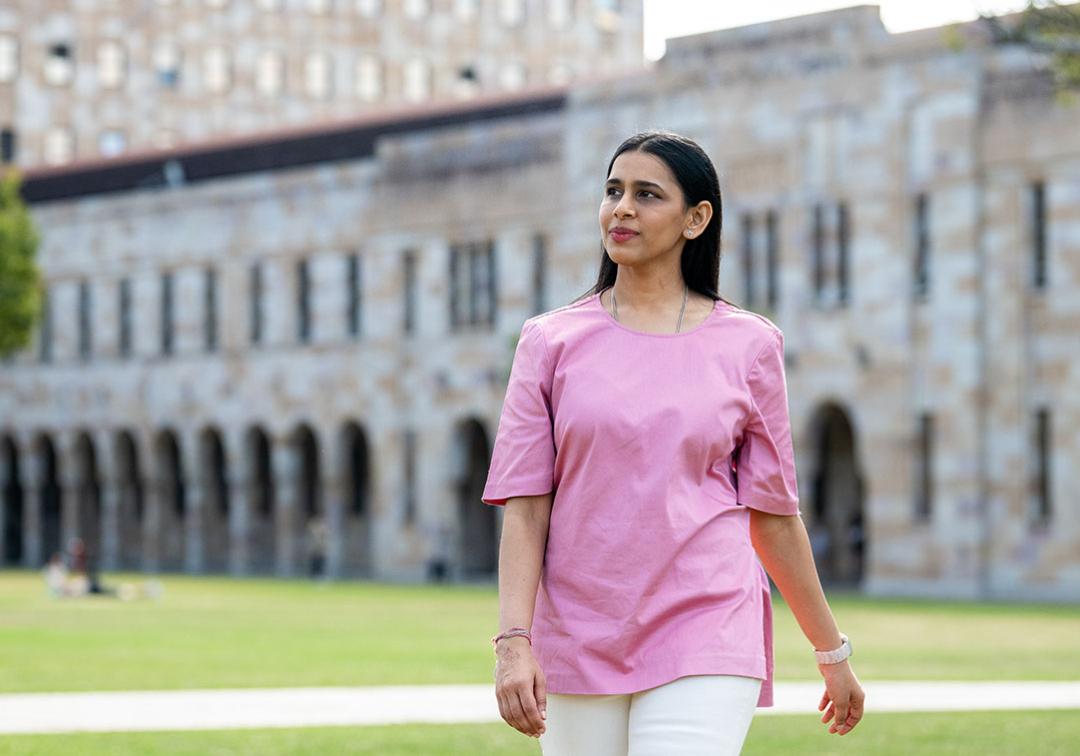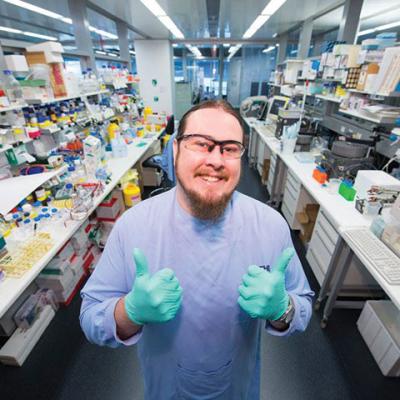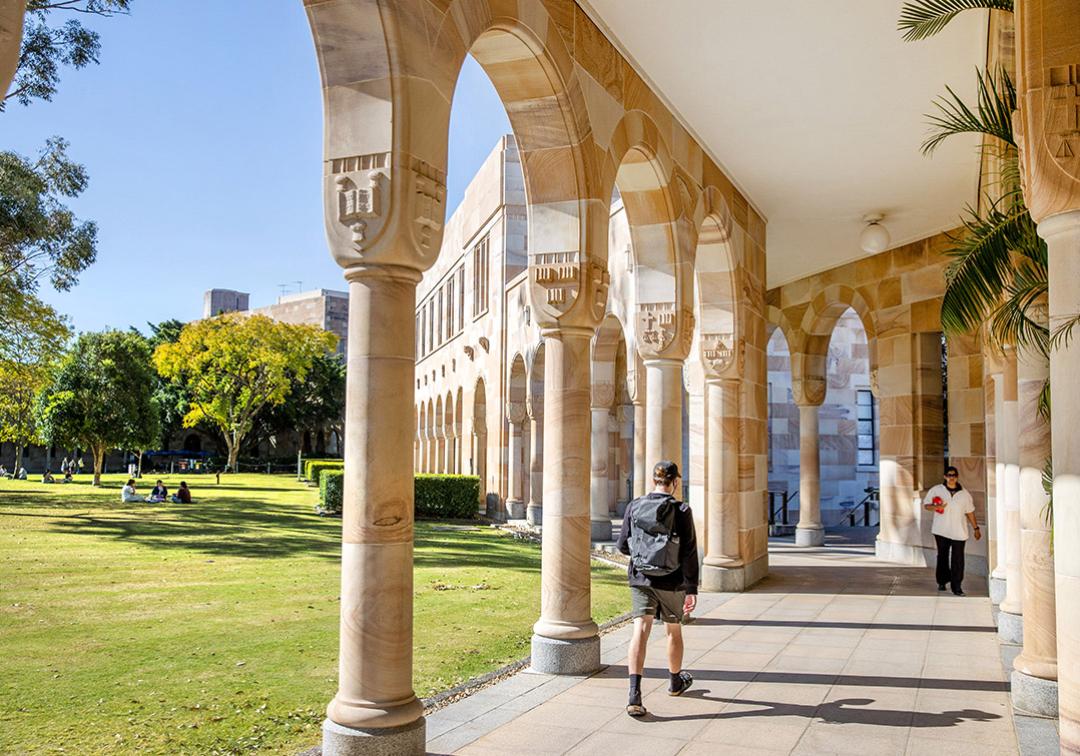
Master of Molecular Biology Research Extensive
Overview
Get a head start in molecular biology research.
Enhance your technical and research skills in core areas of molecular biology, protein technology and bioinformatics through a 2- or 3-semester laboratory immersion.
Undertake research within university laboratories; in an industry setting with co-supervision by one of our academics; or as a placement under an industry-based supervisor. This could be in a company, government department or other suitable organisation.
Master the latest techniques in molecular biology, like:
- protein engineering
- artificial evolution
- enzymology
- high-throughput screening
- bioinformatics
- ancestral sequence reconstruction
- fundamental methods of molecular cloning
- protein purification and LC-MS analysis of small molecules.
Learn how to formulate a hypothesis, design and execute experiments, and become familiar with Australian safety standards.
Hone your scientific communication skills when you present your findings in a scientific manuscript suitable for publication in a relevant scientific journal, and for peer review to your lab group members.
Program highlights
- Study at an international powerhouse of teaching and research in chemical and molecular life sciences.
- Learn from scientists who have contributed to breakthroughs in safer vaccines, antibiotic resistance, viral infections and early breast cancer detection.
- Create and carry out your own research project.
- Put theory into practice, build relationships with potential employers and mentors, and test career options.
How you'll learn
Your learning experiences are designed to best suit the learning outcomes of the courses you choose.
- Lectures
- Tutorials
- Work placements
- Research experience
- Laboratory work
- Workshops
What you'll study
At UQ, degrees are called 'programs' and subjects are called 'courses'. Here's a sample of the courses you could study in this program:
- Advanced Molecular Biology Laboratory
- Advanced Protein Technology
- Advanced Genomics and Bioinformatics
- Immunology and Infectious Diseases
- Concepts in Bioinformatics
Career possibilities
Postgraduate study can take you anywhere. Here are some of the careers you could be on your way to:
- Analytical biochemist
- Genetic pathologist
- Immunologist
- Biotechnologist
- Environmental biologist
- Biomedical science lecturer
- Bioinformatician
- Biopharmaceutical scientist
- Microbiologist
- Embryologist
Average annual salary range
Microbiologist
seek.com.au
Average annual salary range
Embryologist
seek.com.au
Events
See all events
29 June
Queensland Biology Winter School, Year 12

1 July
International Baccalaureate Research Skills Program
Stories
See all stories
Careers
Top 5 reasons to choose UQ for postgraduate study
3-minute read
Stories
See all stories
Careers
Top 5 reasons to choose UQ for postgraduate study
3-minute read
Entry requirements
Entry requirements
It's possible to complete this degree in 2 years or 1.5 years depending on your qualifications and experience.
You can apply for any duration as long as you meet the entry requirements. You may also be eligible to apply for credit or exemptions to shorten your degree further. You'll graduate with the same qualification no matter how long you take to complete the degree.
2-year degree (32 units of study)
To be eligible to complete the degree in 2 years full-time (or part-time equivalent)full-time (only available as full-time study), you'll need:
- a bachelor's degree (or equivalent) in a relevant discipline (see below).
You must have a grade point average (GPA) of 5.5 on a 7-point scale in your previous qualification.
1.5-year degree (24 units of study)
If you have relevant prior learning or experience, you can reduce the number of courses you need to complete and graduate in less time.
To be eligible to complete the degree in 1.5 years full-time (or part-time equivalent)full-time (only available as full-time study), you'll need:
- a bachelor honours degree (or equivalent) in a relevant discipline (see below).
You must have a grade point average (GPA) of 5.5 on a 7-point scale in your previous qualification.
Relevant disciplines for previous qualifications
Relevant disciplines include biotechnology, biomedical science, pharmacy, bioinformatics, genetics, molecular biology, biochemistry, and biological chemistry.
Related programs
Depending on your previous qualifications and current goals, you might want to consider
one of these related programs:
English language requirements
IELTS overall 6.5; reading 6; writing 6; speaking 6; listening 6. For other English Language Proficiency Tests and Scores approved for UQ
TOEFL iBT (including Paper Edition) - Overall 87, listening 19, reading 19, writing 21 and speaking 19.
PTE Academic - Overall Score of 64 and 60 in all sub bands.
BE - A minimum overall grade of 4 plus a minimum grade of C in all macro skills.
CES - Overall 176 and 169 in all sub bands.
OET is not accepted.
There are other ways to meet the English language requirements. For some programs, additional conditions apply.
Student visas
International students who are accepted into full-time study in the Master of Molecular Biology Research Extensive are eligible to apply for an Australian student visa (subclass 500).
There are a number of requirements you must satisfy before a visa is granted, including the Genuine Student (GS) requirement.
Fees and Scholarships
Indicative annual fee
Approximate yearly cost of tuition (16 units). Your fees will vary according to your selected courses and study load. Fees are reviewed each year and may increase.
$9,540
2026
Approximate yearly cost of full-time tuition (16 units). Your fees will vary according to your study load. Fees are reviewed each year and may increase.
AUD $54,096
2026
Government assistance
Financial aid
As an international student, you might be eligible for financial aid – either from your home country, or from the Australian Government.
HECS-HELP
Domestic places in the Master of Molecular Biology Research Extensive are Commonwealth supported, as long as you meet all Commonwealth supported place eligibility requirements.
This means the cost of your education is shared between you and the Australian Government. Instead of tuition fees, Commonwealth supported students pay what are called student contribution amounts.
If you have a Commonwealth supported place, you may also be eligible for HECS-HELP. This is an Australian Government loan scheme to assist eligible students with the cost of their student contribution amounts.
Centrelink support
The Australian Government offers a number of income-support payments to eligible Australian university students.
Scholarships
You may be eligible for more than 100 scholarships, including:
How to apply
Applying online
All international applications should be submitted to UQ. If you prefer, you can use an approved UQ agent near you.
The program code for the Master of Molecular Biology Research Extensive is 5625.
This program is available in multiple durations. You can apply for any duration as long as you meet the entry requirements.
When you apply, select your preferred duration. If you don't meet the requirements for your first preference, we'll automatically consider you for entry into a longer duration.
Applying online
All domestic applications should be submitted to UQ.
The program code for the Master of Molecular Biology Research Extensive is 5625.
This program is available in multiple durations. You can apply for any duration as long as you meet the entry requirements.
When you apply, select your preferred duration. You can also ask us to consider you for a longer duration if you don't meet the entry requirements for your first preference.
Important dates
The closing date for this program is:
- To commence study in semester 2 - May 31 of the year of commencement.
- To commence study in semester 1 - November 30 of the previous year.
Visa processing times vary. Apply and accept your offer as early as you can.
To learn more about UQ dates, including semester start dates, view the Academic Calendar.
Important dates
The closing date for this program is:
- To commence study in Semester 1 - January 31 of the year of commencement.
- To commence study in Semester 2 - June 30 of the year of commencement.
To learn more about UQ dates, including semester start dates, view the Academic Calendar.
Aboriginal and Torres Strait Islander applicants
For support with applying – or if you have any questions about university life – get in touch with our Aboriginal and Torres Strait Islander Studies (ATSIS) Unit.
Explore other programs
Express yourself. And your interest.
They say choosing a degree is hard, which is why we've made it easy. Register your interest and we'll send you everything you need to know about applying to UQ.





